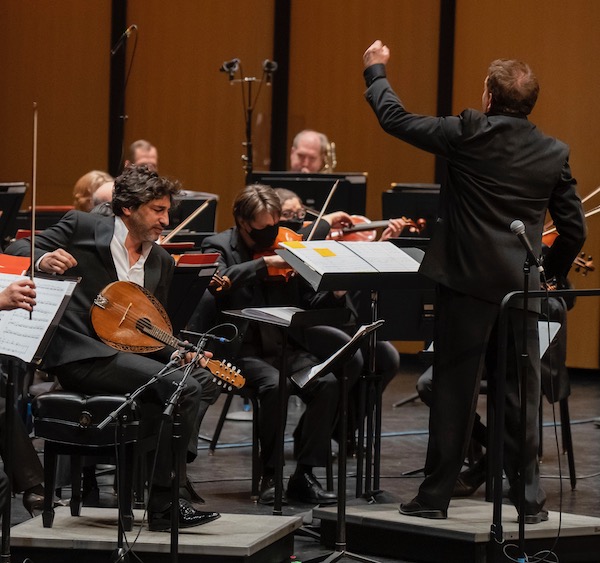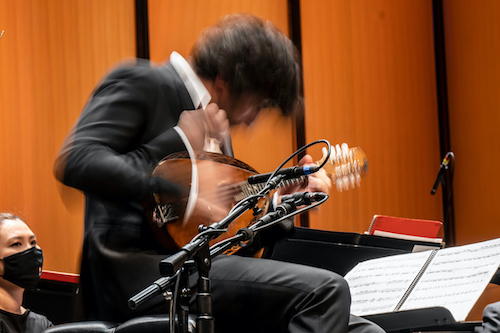Avital lights up U.S. premiere of Higdon’s Mandolin Concerto with Chicago Philharmonic

True to the artistic enterprise that has been a driving force behind the success of the Chicago Philharmonic since its founding 32 years ago, the self-governing ensemble thumbed its nose at freeze-dried convention once again for the third of four 2021-22 concerts, Sunday at the Harris Theater in downtown Chicago.
There wasn’t a symphony or orchestral warhorse within earshot; instead, the frisky program under artistic director and principal conductor Scott Speck held two world premieres, along with one U.S. premiere, of works written by American composers within the last three years. The resident band at neighboring Symphony Center would be hard-pressed to venture something even remotely comparable.
The orchestra of rotating Lyric Opera Orchestra players, freelancers and the odd Chicago Symphony Orchestra ringer or two (CSO concertmaster Robert Chen was deputized as Chicago Phil concertmaster for this occasion) certainly had its work cut out for it. That said, the playing sounded as well-prepared, energized and engaged as one has come to expect from their concerts under Speck’s clear, efficient direction.
The program surrounded works of Ottorino Respighi with a Philharmonic-commissioned fanfare by Nicholas Hubbell; the first performance of Polo Romanesco by Reinaldo Moya, one of the orchestra’s three resident composers; and, as the grand finale, the first American performance (and second performance anywhere) of the Mandolin Concerto by Pulitzer Prize and Grammy-winning composer Jennifer Higdon, a Philharmonic co-commission. Hubbell, Moya and Higdon were all in attendance.
Higdon wrote her 2020 concerto at the behest of the remarkable Israeli virtuoso Avi Avital, who had given the world premiere in Munich in June and who did the honors again on this occasion. In her introductory remarks, the composer confessed she was hearing her opus for the first time, having missed the Munich performances.
Higdon has given us another winner to stand alongside her previous concertos for violin, viola, oboe, soprano saxophone, piano, percussion and full orchestra. Her two-movement opus extends the vocabulary of the mandolin not so much technically as expressively, in ways that surprise the ear with their freshness and contemporaneity.
The bouncy energy of bluegrass in the second movement is married to the gently rippling lyricism of the first, which is couched in modal-tonal harmonies that, in the first section, hark to the populist Americana of Aaron Copland, his Appalachian Spring in particular. The mandolin is one of the softer classical instruments; the composer acknowledges as much by paring down the orchestra to chamber groups for brief dialogues with the soloist. Her familiar attributes—formal clarity, accessibility, melodic grace, highly charged rhythmic energy within shifting meters—are all in evidence in this hugely enjoyable piece, one of roughly 100 new works written for Avital.
A listener whose previous live experience with the mandolin had been confined to mostly decorous performances of baroque chamber music could only be astonished by the electric time-traveling of Higdon via Avital. How was it possible for a mere mortal to move so deftly and accurately across eight tightly packed strings, all the while strumming at supersonic speeds? Higdon has reinvented the mandolin for the early 21st century and has found her ideal musical soulmate in the ever-astonishing Avital.

Sunday’s audience went wild at the end of Higdon’s 20-minute opus, which prompted Avital to return to the stage for a solo encore—a bravura arrangement of a traditional Bulgarian tune, simply titled Prelude. He dispatched it in a white-hot blaze of madly strummed figures and chord progressions.
Time-traveling of another sort informs Moya’s Polo Romanesco (2022). The Venezuela-born, Minnesota-based composer took his inspiration from a popular Venezuelan folk song that makes prominent use of the romanesca, a melodic-harmonic formula originating in the baroque era. (A violinist and guitarist played the folk song before the orchestra let loose on his reworking.) Lasting just under 10 minutes, Polo imbeds the tune in lush orchestration spiced with colorful harmonies, catchy Latin rhythms and instrumental juxtapositions that add to its playfulness. Think of a Venezuelan take on Moncayo’s Huapango and you get the populist effect.
Selected from a field of nearly 40 submissions to the orchestra’s Fanfare Competition, Nicholas Hubbell’s Chicago Fanfare (2019) was inspired by a panoramic photo of the Chicago cityscape by night—an image effectively conveyed by its broad-shouldered sweep and pulsing exuberance. Various groups of instruments are given their 15 seconds of fame before the brief rhythmic romp signs off in a high-energy close.
Speck had the sensible idea of rounding out a program that showcased the mandolin—an instrument most closely associated in listeners’ minds with the Italian baroque—with works by Respighi for chamber orchestra inspired by Italian instrumental music and, respectively, visual art, of earlier eras: the 1928 Gli Uccelli (The Birds) and 1927 Trittico Botticelliano (Botticelli Triptych).
The chirruping strings and cooing woodwinds of Respighi’s avian suite came off to airy, charming effect, not least the portraiture of “La colomba” (The dove) by principal oboe Anne Bach.
Marginally more spontaneous in execution was the tripartite suite the composer based on celebrated paintings by the Italian Renaissance master Sandro Botticelli. The Chicago Phil’s exceptional wind choir came into its own with the central panel depicting the adoration of the magi at the cradle of the Christ child.
The Chicago Philharmonic season will conclude with “Aretha Rising,” May 29 at the Harris Theater. chicagophilharmonic.org.
Posted in Performances





Posted Mar 29, 2022 at 7:02 pm by JUDITH BENTLEY
I agree wholeheartedly with the reviewer. I was there for the concert and the Higdon Mandolin Concerto was tremendous. The audience was trying to refrain from dancing in their seats. Avital was outstanding.
Posted Mar 30, 2022 at 1:42 pm by Richard Eastline
Avital’s command of the mandolin is something to behold in pure astonishment. What many people regard as a parlor or folk-like accompanying instrument becomes a hand-held equivalent of a harpsichord. Higdon gave him a challenging work and he delivered a fully convincing performance.